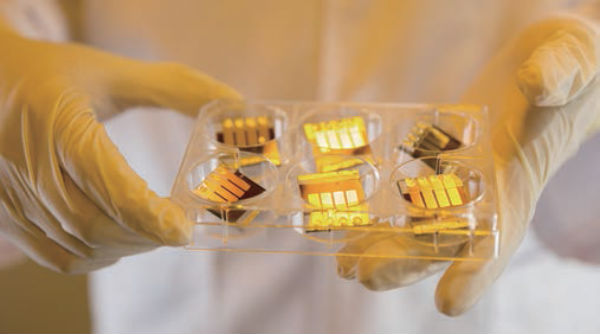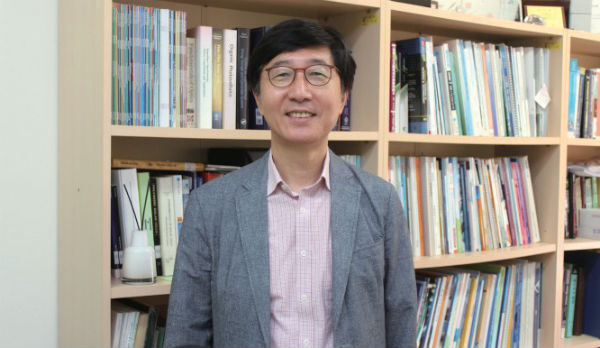Park Nam-gyu, a professor of Chemical Engineering at Sungkyunkwan University (SKKU), has been nominated for the 2017 Nobel Prize in Chemistry. This exciting news comes from the highly reliable information analysis service firm Clarivate Analytics which forecasts a list of Nobel Prize winners every year. Therefore, the Sungkyun Times (SKT) now introduces his study process and interviews him for Kingos.

Professor Park has been working on a study that investigates the principles of a dye-sensitized solar cell using organic dyes, which boosts its efficiency, at the United States (US) National Renewable Energy Laboratory since 1997. It was necessary to find high light absorbing material because dye-sensitized solar cells were not highly efficient like silicon solar cells. Professor Tsutomu Miyasaka, a Japanese scientist who firstly started developing perovskite solar cells, introduced a solar cell which used perovskite structured material instead of an organic dye, but it couldn’t attract enough scientific attention because its efficiency was very low. Additionally, perovskite solar cells using liquid electrolytes were not stable because perovskite structured material could easily melt into liquids, so there were no follow up studies of perovskite solar cells. Professor Park was the first to develop solid state perovskite solar cells that have 9.7% efficiency and are stable for 500 hours. Since the study was announced in Scientific Report, published from Nature, in 2012, a lot of follow-up studies about solid state perovskite have been produced, becoming the focus of researchers worldwide. There are some significant advances in the development of perovskite solar cells. First, perovskite solar cells are cheaper than silicon, the raw material that is currently the most commercialized. Equipment costs are also reduced because there
is no need for high cost vacuum equipment. Second, research on perovskite solar cells has exploded worldwide. Professor Park’s paper has been quoted more than 1,260 times, and the number of papers related to perovskite solar cells as follow-up studies reached around 2,000 last year. Third, it is the second time for a South Korean to be nominated for the Nobel Prize in Chemistry by Clarivate Analytics. The first was a professor from the Korea Advanced Institute of Science and Technology (KAIST), and the second is Professor Park. Since Korea is investing in research and development of all scientific areas of the basic and applied fields without requiring short-term research periods and research results, it seems possible to expect a Nobel Prize winner sooner than later.

An Interview with Professor Park Nam-gyu

Q1. You are the forerunner of the perovskite solar cells. Would you please explain what a perovskite solar cell is?
Perovskite is the name of the material structure, and the material is an oxide obtained from minerals. The most important aspects of solar cells are efficiency, price, and reliability. First, the efficiency of the perovskite solar cell is very high. Second, the most efficient material, gallium arsenide, is costly to produce, which results in high electricity costs, but perovskite is very cheap and has similar characteristics to gallium arsenide. The efficiency of the perovskite is presently 22%, and it will eventually be able to achieve more than the 29% of gallium arsenide. The stability of the perovskite is still a drawback, so it is a matter that requires improvement. Third, since perovskite structured material is a useful material for X-rays and LEDs, it will be able to utilize basic properties to expand and develop the research further.
Q2. You have been studying solar cells for more than 20 years. Were there any difficulties you have encountered that made you feel like giving up? How did you overcome it?
I think the most important thing in conducting research is having good manpower around the researcher. I was fortunate to be able to conduct research with formidable people both domestically and abroad, and the students at SKKU also displayed excellent performances. The hardest thing was not conducting the study itself, but rather when I was doing my doctorate course. I had initially studied for two years for the doctorate course, but it was almost impossible to get a Doctor of Philosophy (PhD) and publish a paper because of some circumstances. Thanks to that experience where I almost failed, however, I was able to gain vital experiences doing experiments every day, and it greatly contributed to my future research.
Q3. You were nominated for the Nobel Prize in Chemistry by Clarivate Analytics. What do you think is required to potentially win the Nobel Prize?
I think the attitude of a researcher to study in one field for a long period of time and the creation of a productive research environment are needed. In Japan, the government is highly interested in the Nobel Prize. The Korean government also needs to pay keen attention to it. Researchers will be able to further their research if the government grants generous encouragement, praise, and compensation to researchers. In the meantime, Korean researchers have gone to study abroad because of Korea’s lack of infrastructure, but now there is a positive atmosphere for research as the government is starting to support the development of great study environments. It is likely that a Nobel Prize winner will come from Korea in the near future.
Q4. While teaching students as a professor at SKKU, what is inconvenient in terms of the passion or hope of students compared to the past?
A lack of passion is not an issue for university students these days. One thing that is different is that students in the past had to create elements needed in the research themselves because they had nothing to work with in terms of equipment. Nowadays,
however, the situation is much improved, and students have access to much more equipment than in the past. Of course it may be convenient to use equipment bought from stores, but it would be nice for them to make equipment themselves and develop their own skills.
Q5. Any last words for Kingos?
History is important, but it is also important not to concentrate on the past too much and to live in the now faithfully. If you live a worthy day every day, it will eventually add up to a collection of days that becomes a great future. I wish for students to have bigger dreams. The first Korean nominee for the Nobel Prize in Chemistry was a professor from KAIST, and the second is from SKKU. It is highly likely that SKKU is highly ranked and students should be proud of that. I think we can achieve our dreams if we take pride in ourselves, along
with our university which contributes to the development of the world.
